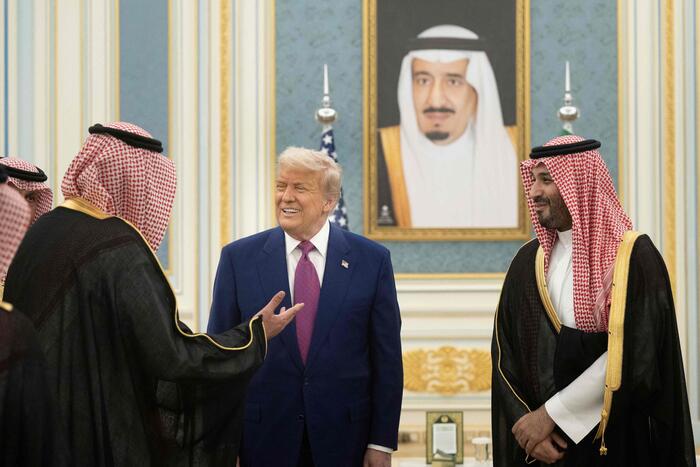On Tuesday,U.S. President Donald Trump kicked off his first international trip since beginning his second term with a series of high-level agreements signed in Riyadh alongside Saudi Crown Prince Mohammed bin Salman. The deals include a bilateral economic partnership framework, a defense cooperation pact aimed at modernizing the Saudi military, an energy agreement, and a space collaboration between the Saudi Space Agency and NASA.
Additional memorandums were signed covering mining resources, judicial cooperation and infectious disease control.
According to Saudi outlet Asharq al-Awsat, the visit reaffirms Saudi Arabia’s central role in regional geopolitics and marks a shift from the 2017 visit, with the Kingdom now seeking to define its relationship with Washington on more equal footing.
Trump’s itinerary includes stops later this week in Qatar and the United Arab Emirates, two countries where his family’s private business interests have also expanded significantly. That overlap is drawing renewed scrutiny from ethics watchdogs and U.S. media outlets, which have reported extensively on new deals promoted by the president’s sons in recent weeks.
Meanwhile, Eric and Donald Trump Jr. have attended public events across the Gulf in the lead-up to the president’s arrival. In Dubai, Eric Trump unveiled plans for an 80-story luxury tower featuring what he described as the world’s highest infinity pool overlooking the Burj Khalifa. In Qatar, he announced a $5.5 billion project called the Trump International Golf Club Simaisma, described by the company as an “ultra-luxury beachside community.”
At the same time, an Abu Dhabi sovereign wealth fund has pledged a $2 billion investment in World Liberty Financial, the Trump family’s crypto firm. Company documents list Eric Trump as a board member and President Trump as its “Chief Crypto Advocate.” The company’s dollar-pegged digital coin is expected to be used in the transaction.
At the same time, Trump praised Qatar’s gift of a customized Boeing 747-8 aircraft, which he said would serve as Air Force One for the remainder of his presidency before being transferred to his future presidential library. “I think it’s a great gesture from Qatar,” he said Monday. “I would never be one to turn down that kind of offer. I mean, I could be a stupid person [and] say, ‘No, we don’t want a free, very expensive airplane.’ But it was — I thought it was a great gesture.” He called the plane a “palace in the sky.”
The White House has rejected suggestions that the president is using public office to enrich himself. “President Trump is compliant with all conflict-of-interest rules, and only acts in the best interests of the American public,” said press secretary Karoline Leavitt in a statement. Speaking at a press briefing, she called it “frankly ridiculous that anyone in this room would even suggest that President Trump is doing anything for his own benefit,” and added that he “left a life of luxury and a life of running a very successful real estate empire for public service.”
No full schedule or list of meetings has been released for the trip, and the White House has not provided a travel manifest for those accompanying the president on Air Force One— a departure from standard protocol.
In Riyadh, Trump attended a private lunch with more than 30 top U.S. business executives. Among them were Elon Musk (Tesla), Sam Altman (OpenAI), Larry Fink (BlackRock), Andy Jassy (Amazon), Jane Fraser (CitiGroup), Jensen Huang (Nvidia), Arvind Krishna (IBM), Alex Karp (Palantir), Ruth Porat (Google), Kelly Ortberg (Boeing), Ray Dalio (Bridgewater), James Quincey (Coca-Cola), and Miami Mayor Francis Suarez.
In 2024, trade between the U.S. and Saudi Arabia reached $32 billion, with Saudi exports totaling $13 billion and imports from the U.S. amounting to $19 billion. U.S. direct investment in the Kingdom totaled $15.3 billion, with 28 operational American-linked factories in industrial zones in Jubail and Yanbu.
The Trump Organization also maintains active business operations in Oman, Serbia, Albania, and Vietnam. But analysts note that the family’s footprint in the Gulf region, particularly in real estate, crypto, and investment circles, poses the most direct overlap between U.S. foreign policy and private financial interests.
According to business figures in the region, who spoke on condition of anonymity, close ties between government and business are routine and even seen as an advantage in project execution. “If the Americans are concerned about a conflict of interest,” one executive said, “it’s their responsibility to enforce their own laws.”











